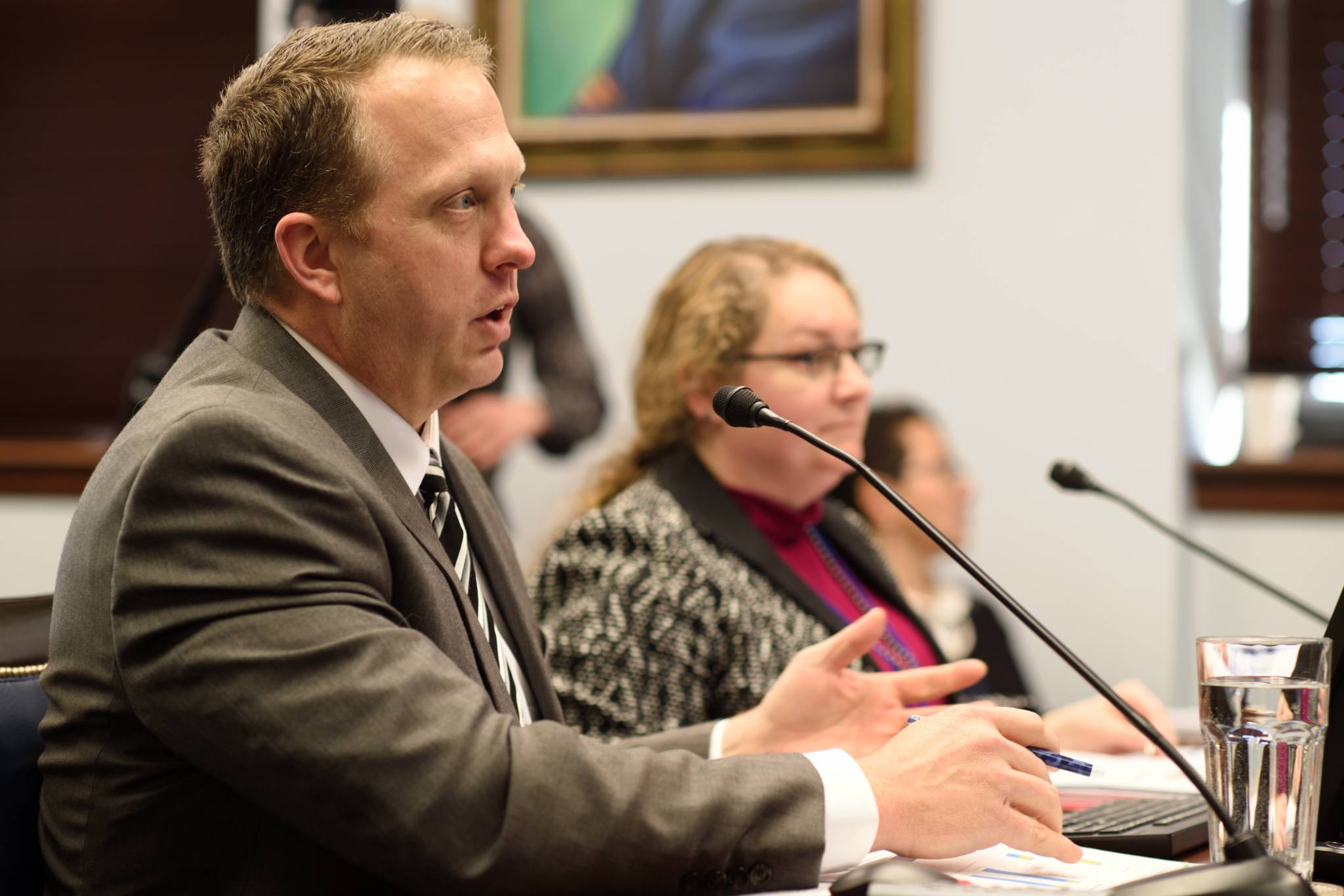2:08 p.m.
Bringing in a consultant will cost between $60,000 and $90,000, acccording to this presentation. Holland says this will come out of the AMHS operating budget. McLaren says this year will be “very tight” for the marine highway in terms of its budget.
— Alex McCarthy
2:05 p.m.
Another part of the plan for the AMHS is to bring in a consultant to develop a new plan for the future of the ferry system. Holland shows what she calls an “aggressive” timeline for bringing that consultant in. The project went out for bid March 1 and consultants have until March 11 to apply, according to this presentation.
Hughes says she’s curious about this short timeline. Holland says they’ve already talked with three interested parties and the governor’s administration “felt the aggressive timeline could still result in receipt of a qualified bid. They want to get moving as quickly as possible.”
The timeline shows that the consultant’s final report would be due July 31 of this year.
— Alex McCarthy
1:45 p.m.
We’re at the second Alaska Marine Highway System meeting of the day. Office of Management and Budget Management Director Amanda Holland and AMHS Business Enterprise and Development Manager Matt McLaren are speaking to the Senate Transportation Committee.
As you know, Gov. Mike Dunleavy’s budget proposal would cut the ferry system’s budget by 75 percent in the next fiscal year. As Committee Chair Sen. Shelley Hughes says at the beginning of this meeting, the ferry system would “cease as we know it” as a result.
Related, from Senate Finance earlier:
Guettabi says, will there be out-migration? (as a result of the Dunleavy budget)
Sen. Bert Stedman "Not by the Marine Highway"
*laughter*
Stedmans says he couldn't resist#akleg— Kevin Baird (@alaska_kev) March 7, 2019
— Alex McCarthy
12:30 p.m.
Jo McGuire, a senior project manager for The Safety Specialists, is speaking to the Juneau Chamber of Commerce at the Hangar.
She points out data that shows Alaska is the third highest usage state in the country.
Some of her main points are how marijuana consumption affects safety in the workplace and on the roads. She says right now there is no real way to convict people for driving under the influence of drugs (DUID).
“We have to pay attention to this issue and slow down,” she says. “We need to establish a DUID standard that is non-contestable.”
McGuire points out that people can find solutions to these issues, just like they did for alcohol.
— Mollie Barnes
10:45 a.m.
This committee (the House Fisheries Committee) will move Vincent-Lang to the next step in the process, which will be a joint session. That doesn’t necessarily mean that all of the representatives on this committee will vote for him, as Chair Rep. Louise Stutes says.
Rep. Chuck Kopp speaks glowingly of Vincent-Lang here, saying it’s been a while since the Fish and Game commissioner has had such a strong background in research. He and Stutes both say they’d like to see Vincent-Lang keep his word, commit to maintaining healthy fisheries and to make science-based decisions over political ones.
— Alex McCarthy
10:17 a.m.
Vincent-Lang is asked whether he can tune out political pressures and make science-based decisions on whether to close fisheries or keep them open. Vincent-Lang says there was pressure recently to keep a Chinook salmon fishery in the Susitna River open as a catch-and-release fishery, but that he made the decision to close it anyway.
“Conservation is No. 1,” he says. “Sustainability is No. 1.”
— Alex McCarthy
10:13 a.m.
We’re at a confirmation hearing for Department of Fish and Game designee Doug Vincent-Lang. Vincent-Lang gives a brief opening statement providing some biographical information and saying he’s always been impressed with how much Alaskans care about the department.
“People fundamentally care about Fish and Game,” he says. “It’s a curse and a blessing.”
In terms of goals, he lists: putting food on the table, preserving trust in the department, ensuring that the state has control over its resources (instead of federal control), and ensuring that the next generations of Alaskans can hunt and fish.
In reference to the so-called Stand For Salmon initiative in the past election, Vincent-Lang says he didn’t think the laws should have been rewritten by the voters. He said he’s open to conversations about salmon habitat management, though.
— Alex McCarthy
9:53 a.m.
Sen. Peter Micciche, R-Soldotna, questioned why the private sector would rush in to Alaska when this budget is passed, in Senate Finance Committee.
He said, “We’re not cutting income taxes, we’re not cutting corporate taxes.”
He pointed out that taxes would be raised on a local level if the fisheries and oil/gas property taxes are removed.
“How does the private sector rush in?” Micchiche asks.
— Kevin Baird
9:07 a.m.
Today begins with a continuation of a key meeting of the Senate Finance Committee about the economic impact of the governor’s budget.
Right now, Mouhcine Guettabi from the Institute of Social and Economic Research, or ISER, will present on the organization’s estimates about how this budget will impact jobs and the state’s economy. Guettabi spoke to us a few weeks ago when the budget first came out, and you can read what he said here.
At 1 p.m., Ed King, the lead economist for the Office of Management and Budget, will continue a presentation to the committee on the governor’s proposed budget. King presented seven of his 23 slides to the committee Wednesday, and spoke to media members afterward.

